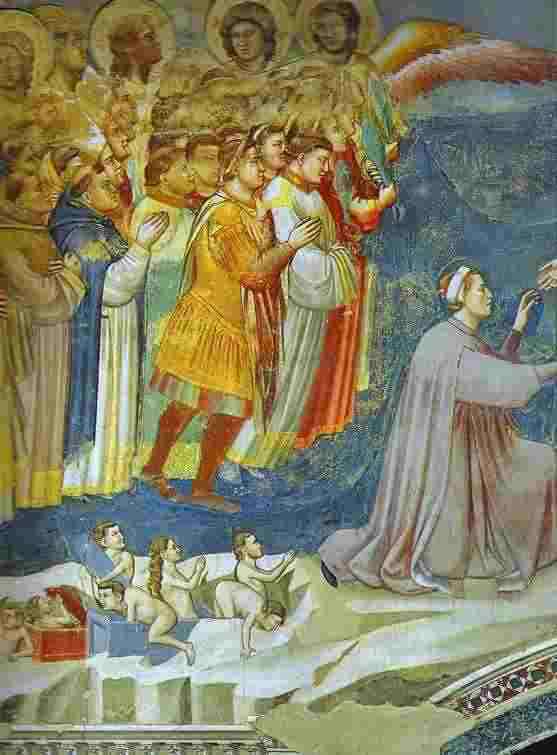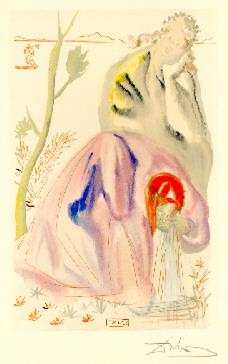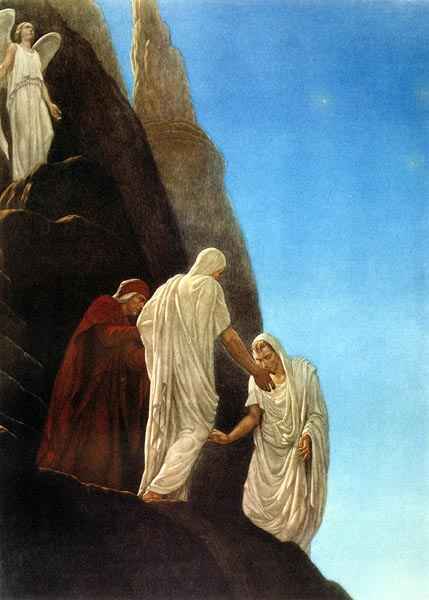 |
 |
 |
|
|
|
|
 |
 |
 |
|
|
|
|
| PURG21 |
|
|
|
|
| ........... | ....... G.GUAITA |
................................. H.W.LONGFELLOW |
...... .D.ALIGHIERI |
....... ... | ....... |
| 1
|
La
séj
ad
tüt
savéj,
che sémp an pìa, che 's pàzia maj se nén bevénd cul'àqua che vulìva la dòna 'd Samarìa, |
The
natural thirst, that ne'er is satisfied Excepting with the water for whose grace The woman of Samaria besought, Put me in
travail, and haste
goaded me And lo! in the
same manner
as Luke writeth |
La
sete
natural
che
mai non sazia se non con l'acqua onde la femminetta samaritana domandò la grazia, |
| 4
|
am
dàva
pén'a,
e
ànche
iàva prèsa d'andè près al maèstru, stand atént; e 'n pü, andànd, sufrìva par cuj giüst turmént. |
mi
travagliava, e
pungeami la fretta per la 'mpacciata via dietro al mio duca, e condoleami a la giusta vendetta. |
|
| 7
|
E
pròpi
mè
ca
l'è
che 'l Lüca scrìu, che Crìstu as mùstra ai duj che ién par vìa, urmàj fòra dla tòmba turnà viv, |
Ed ecco,
sì
come ne scrive Luca che Cristo apparve a' due ch'erano in via, già surto fuor de la sepulcral buca, |
|
| 10
|
n'òmbra
vdùma,
daré
da
nuj
la vnìva, fazéd ben atensiòn ai cugià 'n tèra; nànca iàvu 'ncurgìsni che léj iéra. |
A
shade appeared to us, and came behind us, Down gazing on the prostrate multitude, Nor were we ware of it, until it spake, Saying, "My
brothers, may
God give you peace!" Thereon began he:
"In the
blessed council, |
ci
apparve un'ombra,
e dietro a noi venìa, dal piè guardando la turba che giace; né ci addemmo di lei, sì parlò pria, |
| 13
|
E
'n
dis:"A
vuj
la
pas dal nos Signùr"; iùma giràsi sübit e Virgìlio cun sëgn dla tèsta ai rénd a lü l'unùr. |
dicendo;
«O
frati miei, Dio vi dea pace». Noi ci volgemmo sùbiti, e Virgilio rendéli 'l cenno ch'a ciò si conface. |
|
| 16
|
"Che
't
dàga
a
ti
par sémp la pas an cél cùla Giüstìsia - ai dis al mè maèstru - che fòra 'm tén par sémp dal Paradìs". |
Poi
cominciò:
«Nel beato concilio ti ponga in pace la verace corte che me rilega ne l'etterno essilio». |
|
| 19
|
"Mè
l'è
-'n
ciàma
e
'ntant i andàvu fort -, se òmbri i séj che 'l cél l'ha nén vursü', chi l'è guidàvi alùra fìn'a chi?". |
"How,"
said he, and the while we went with speed, "If ye are shades whom God deigns not on high, Who up his stairs so far has guided you?" And said my
Teacher: "If
thou note the marks But because she
who spinneth
day and night |
«Come!»,
diss'elli, e parte andavam forte: «se voi siete ombre che Dio sù non degni, chi v'ha per la sua scala tanto scorte?». |
| 22
|
"Se
ti
't
fè
mént
ai sëgn che ià cuschì, che l'àngial cun la spà taiànd al màrca, 't vidrè che lü l'è pront a muntè 'n cél. |
E 'l
dottor mio:
«Se tu riguardi a' segni che questi porta e che l'angel profila, ben vedrai che coi buon convien ch'e' regni. |
|
| 25
|
Parchè
cùla
che
dì
e
nöt travàja l'àva par lü 'ncù nén finì 'd filè, cul toc che Clòto a ognadün i arfìla, |
Ma
perché
lei che dì e notte fila non li avea tratta ancora la conocchia che Cloto impone a ciascuno e compila, |
|
| 28
|
l'ànima
sùa
ancùra
al
corp
giü mìsta, avnénd chi sü, pudìva nén vnì sùla, parchè nén mè la nòsa ià la vìsta. |
His
soul, which is thy sister and my own, In coming upwards could not come alone, By reason that it sees not in our fashion. Whence I was
drawn from out
the ample throat But tell us, if
thou knowest,
why such a shudder |
l'anima
sua, ch'è
tua e mia serocchia, venendo sù, non potea venir sola, però ch'al nostro modo non adocchia. |
| 31
|
Dal
Lìmbu
fòra
iù
stat
ciamà par lü; iù già mustrài mi, fin chi rivè; e ancùra mi i mustrù par quànt pös fè. |
Ond'io
fui tratto
fuor de l'ampia gola d'inferno per mostrarli, e mosterrolli oltre, quanto 'l potrà menar mia scola. |
|
| 34
|
Ma
dìmi
ti
'l
parchè
di 's supatòn che l'è àvì 'l mont dal fond di so radìs e 'n crìj iùma santì putént mè 'l tron". |
Ma dimmi,
se tu sai,
perché tai crolli diè dianzi 'l monte, e perché tutto ad una parve gridare infino a' suoi piè molli». |
|
| 37
|
Ciamànd
a
l'ha
'mbrucà
lònche
i vulìva e 'ntant che la rispòsta i aspitàva, ménu la séj che iàva 'm turmantàva. |
In
asking he so hit the very eye Of my desire, that merely with the hope My thirst became the less unsatisfied. "Naught is
there," he began,
"that without order Free is it here
from every
permutation; |
Sì
mi diè,
dimandando, per la cruna del mio disio, che pur con la speranza si fece la mia sete men digiuna. |
| 40
|
"Niénte
càpita
-
an
dis
- ansìma 's mont, ca sìa còntra a lònche l'è urdinà, o c'àbia a èsi fòra d'ògni üzànsa. |
Quei
cominciò:
«Cosa non è che sanza ordine senta la religione de la montagna, o che sia fuor d'usanza. |
|
| 43
|
Chi
d'ògni
evulüsiòn
i
sùma
lìbar, tüt lònche i vén chi sü, l'è indipendént, e 'l tròva mèc an Cél la so razòn. |
Libero
è qui
da ogne alterazione: di quel che 'l ciel da sé in sé riceve esser ci puote, e non d'altro, cagione. |
|
| 46
|
Chi
sü
piöva,
tampèsta,
ruzà,
fiòca e ànche brìn'a i pölu nén s'ciarèsi , dla scalëta, pü sü, di trè gradìn; |
Because
that neither rain, nor hail, nor snow, Nor dew, nor hoar-frost any higher falls Than the short, little stairway of three steps. Dense clouds do
not appear,
nor rarefied, No arid vapour
any farther
rises |
Per che
non pioggia,
non grando, non neve, non rugiada, non brina più sù cade che la scaletta di tre gradi breve; |
| 49
|
chi
nìvuli
ién
nén
né
s'ciàsi o ràri, né lòzni o tron e nànca l'arcansièl, che l'è, mè i dìzu i Gréc, al fiö 'd Taumànte; |
nuvole
spesse non
paion né rade, né coruscar, né figlia di Taumante, che di là cangia sovente contrade; |
|
| 52
|
al
vapùr
sëc
che
'n
tèra l'è stermà 'l vén nén pü sü di trè gradìn ch'iù dit, 'ndùa 'd San Péru l'àngial guàrdia i fa. |
secco
vapor non surge
più avante ch'al sommo d'i tre gradi ch'io parlai, dov'ha 'l vicario di Pietro le piante. |
|
| 55
|
Pü
giü
da
chi,
sì,
'l trëma poc o tant; ma par cul vént che sta starmà sut tèra, chi sü, ch'i sàpia mi, l'ha maj tarmà. |
Lower
down perchance it trembles less or more, But, for the wind that in the earth is hidden I know not how, up here it never trembled. It trembles here,
whenever
any soul Of purity the
will alone
gives proof, |
Trema
forse più
giù poco o assai; ma per vento che 'n terra si nasconda, non so come, qua sù non tremò mai. |
| 58
|
Al
trëma
chi
se
n'ànima
püra 's sént , da 'ndè pü sü o ànche muntè 'n cél, e lu cumpàgna 'l crìj di penitént. |
Tremaci
quando alcuna
anima monda sentesi, sì che surga o che si mova per salir sù; e tal grido seconda. |
|
| 61
|
S'
iün as sént d'andè sü, cul l'è
mundà, ad tramüdè dès ià la libertà, e alùra d'andè sü as sént cuntént. |
De la
mondizia sol
voler fa prova, che, tutto libero a mutar convento, l'alma sorprende, e di voler le giova. |
|
| 64
|
La
vòja
che
al
pecà
'l pruvàva prìma, adès lu fa a la pén'a afesiunà; la giüstisia divìn'a völ cuzì. |
First
it wills well; but the desire permits not, Which divine justice with the self-same will There was to sin, upon the torment sets. And I, who have
been lying
in this pain Therefore thou
heardst the
earthquake, and the pious |
Prima
vuol ben, ma
non lascia il talento che divina giustizia, contra voglia, come fu al peccar, pone al tormento. |
| 67
|
E
mi
che
sincsént
àni
e ànche 'd pü, imòbil iàva stat chi giü cugià, la vòja iù santì ad muntè sü: |
E io, che
son giaciuto
a questa doglia cinquecent'anni e più, pur mo sentii libera volontà di miglior soglia: |
|
| 70
|
al
mont
a
l'ha
tarmà
ad cuntantësa, e i ànimi tüti ién ludà 'l Signùr, pregànd as bèl mumént ànche par lur". |
però sentisti
il tremoto e li pii spiriti per lo monte render lode a quel Segnor, che tosto sù li 'nvii». |
|
| 73
|
Cuzì
'n
dis
,
e
parchè l'è 'n fat scüntà che püsè iün ià séj, pü 'l god,a béivi, as pöl nén dì 'l piazì che iù pruvà". |
So
said he to him; and since we enjoy As much in drinking as the thirst is great, I could not say how much it did me good. And the wise
Leader: "Now
I see the net Now who thou wast
be pleased
that I may know; |
Così ne disse;
e però ch'el si gode tanto del ber quant'è grande la sete. non saprei dir quant'el mi fece prode. |
| 76
|
E
'l
düca
a
lü:"Adès
iù ciàr an tèsta quàl l'è la réi che 'v tén, e mè 's vén fòra, parchè chi 'l trëma as mont e i féj gran fèsta. |
E 'l
savio duca:
«Omai veggio la rete che qui v'impiglia e come si scalappia, perché ci trema e di che congaudete. |
|
| 79
|
Adès
dìmi
chi
t'éri
,
par piazì, e parchè tàntu témp t'è stat ti chi, spiégamlu, 't prég par bén, che i völ capì". |
Ora chi
fosti, piacciati
ch'io sappia, e perché tanti secoli giaciuto qui se', ne le parole tue mi cappia». |
|
| 82
|
"Quànd
Tìto
imperatùr
l'è
stat
iütà da Dìu a vendichèsi di cul sang che l'éra stat vindì dal traditùr, |
"In
days when the good Titus, with the aid Of the supremest King, avenged the wounds Whence issued forth the blood by Judas sold, Under the name
that most
endures and honours, My vocal spirit
was so sweet,
that Rome |
«Nel tempo
che 'l buon Tito, con l'aiuto del sommo rege, vendicò le fóra ond'uscì 'l sangue per Giuda venduto, |
| 85
|
mi
iéra
al
mond
famùs
e numinà cu' al nom pü bèl che 'l düra e tant unùra, ma 'n Crìstu iàva nén mi féde ancùra. |
col nome
che più
dura e più onora era io di là», rispuose quello spirto, «famoso assai, ma non con fede ancora. |
|
| 88
|
'D
fè
puisìi
avénd
la
vén'a bòn'a, mi, tuluzàn, ciamà iù stat a Rùma, e ànche là premià cun la curòn'a. |
Tanto fu
dolce mio
vocale spirto, che, tolosano, a sé mi trasse Roma, dove mertai le tempie ornar di mirto. |
|
| 91
|
Stàsiu
iù
nom
e
i
son 'ncù sémp ansl'ònda: mi 'd Tébe iù cantà e pö d' Achìlle; ma s'övra mi, 'd finìla iù nén fat témp. |
Statius
the people name me still on earth; I sang of Thebes, and then of great Achilles; But on the way fell with my second burden. The seeds unto my
ardour
were the sparks Of the Aeneid
speak I, which
to me |
Stazio la
gente ancor
di là mi noma: cantai di Tebe, e poi del grande Achille; ma caddi in via con la seconda soma. |
| 94
|
Dal
föc
dla
mè
puizìa
l'alimént, l'è stat par mi cùla divìn'a fiàma che l'ha infiamàni tànti, püsè 'd sént; |
Al mio
ardor fuor
seme le faville, che mi scaldar, de la divina fiamma onde sono allumati più di mille; |
|
| 97
|
l'Enèide,
i
dis,
che
'l
lat dla puizìa l'ha dat a mi, 's pöl dì, l'è fat da màma; mi niénte fat i avrìa sénsa 'd lé. |
de
l'Eneida dico,
la qual mamma fummi e fummi nutrice poetando: sanz'essa non fermai peso di dramma. |
|
| 100
|
Par
èsi
vivì
'n
tèra
a cuj témp là e truvèmi 'd Virgìlio 'n cumpanìa, ad peniténsa, n àni ancù i farìa". |
And
to have lived upon the earth what time Virgilius lived, I would accept one sun More than I must ere issuing from my ban." These words
towards me made
Virgilius turn For tears and
laughter are
such pursuivants |
E per
esser vivuto
di là quando visse Virgilio, assentirei un sole più che non deggio al mio uscir di bando». |
| 103
|
Virgìlio
a
si
paròli
l'è
giràsi e cun la fàcia lü 'm dizìva:"Tas", ma fòrsa 'd vuluntà nén sémp l'è bàsta; |
Volser
Virgilio a
me queste parole con viso che, tacendo, disse 'Taci'; ma non può tutto la virtù che vuole; |
|
| 106
|
che
'l
rìdi
e
'l
piànzi i vén'u natüràj e près al sentimént che l'è pü vér, e 'd tant püsè, an cuj che ién sincér. |
ché riso e
pianto son tanto seguaci a la passion di che ciascun si spicca, che men seguon voler ne' più veraci. |
|
| 109
|
Quànd
mi
d'avéj
capì
iù
fàji sëgn, alùra l'òmbra che l'è lì 'n silénsiu antal lümìn ad i öc' am vàrda fis: |
I
only smiled, as one who gives the wink; Whereat the shade was silent, and it gazed Into mine eyes, where most expression dwells; And, "As thou
well mayst
consummate a labour Now am I caught
on this side
and on that; |
Io pur
sorrisi come
l'uom ch'ammicca; per che l'ombra si tacque, e riguardommi ne li occhi ove 'l sembiante più si ficca; |
| 112
|
"Mi
t'àugür
da
rivè
tost
a la fin; - am dis - ma parchè, se ti 'd mi tat fìdi iù vist pasèti 'nti öc' na vòja 'd rìdi?". |
e
«Se tanto
labore in bene assommi», disse, «perché la tua faccia testeso un lampeggiar di riso dimostrommi?». |
|
| 115
|
Adès
la
sitüasiòn
par
mi
l'è grìza: iün am fa tàzi e l'àut al völ ch'i dìza; al mè maèstru, vdéndmi suspirè: |
Or son io
d'una parte
e d'altra preso: l'una mi fa tacer, l'altra scongiura ch'io dica; ond'io sospiro, e sono inteso |
|
| 118
|
"Pü
nén
ad
parlè
ciàr
àbia pagüra; ti dìji liberament al to pensé e cul che 'l völ savèj cun tanta cüra". |
"Speak,"
said my Master, "and be not afraid Of speaking, but speak out, and say to him What he demands with such solicitude." Whence I: "Thou
peradventure
marvellest, This one, who
guides on high
these eyes of mine, |
dal mio
maestro,
e «Non aver paura», mi dice, «di parlar; ma parla e digli quel ch'e' dimanda con cotanta cura». |
| 121
|
"Ti
tat
ciamàvi
-
ai
dis - spìrit antìc, la razòn dal parchè poc fa i ridìva; dès ta vnirà pü gròsa maravìja. |
Ond'io:
«Forse
che tu ti maravigli, antico spirto, del rider ch'io fei; ma più d'ammirazion vo' che ti pigli. |
|
| 124
|
Cuschì
che
'm
guìda
e
'l mùsta a mi la vìa 'l Virgìlio l'è, che fòrsa a ti l'è dàti 'd cantè i eròi dla tèra e i dèi dal cél. |
Questi
che guida
in alto li occhi miei, è quel Virgilio dal qual tu togliesti forza a cantar de li uomini e d'i dèi. |
|
| 127
|
Mec
par
suchì,
e
nén
par d'àut ridìva, ti 't sàvi nén che cul che ti 't dizìvi a ti l'éra davànti e già tlu vdìvi". |
If
other cause thou to my smile imputedst, Abandon it as false, and trust it was Those words which thou hast spoken concerning him." Already he was
stooping to
embrace And he uprising:
"Now canst
thou the sum |
Se cagion
altra al
mio rider credesti, lasciala per non vera, ed esser credi quelle parole che di lui dicesti». |
| 130
|
Cul
sübit
l'è
bütàsi
an
ginuiòn par 'mbrasèlu ai pé, ma 'l mè maèstru: "Fa nén cuzì, mè ti, mi òmbra i son". |
Già s'inchinava
ad abbracciar li piedi al mio dottor, ma el li disse: «Frate, non far, ché tu se' ombra e ombra vedi». |
|
| 133
|
E
lü,
ausàndsi
sü:"Dès
la
quantità 't pöli cumpréndi dl'amùr che 't port, se i dizmantìj che i sùma fat ad nén, |
Ed
ei surgendo:
«Or puoi la quantitate comprender de l'amor ch'a te mi scalda, quand'io dismento nostra vanitate, |
|
| 136 | e i òmbri i trat mè i füisu di corp vér". | Treating a shadow as substantial thing." | trattando l'ombre come cosa salda». |